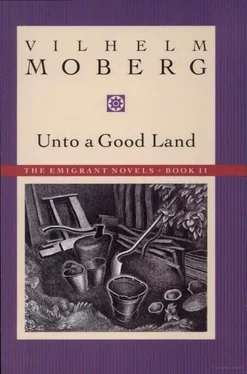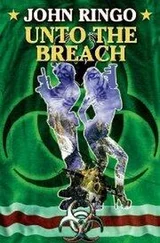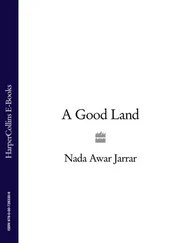It was gentry she saw walking about there near the big house with the tower; the women had umbrellas like the ladies at home in Sweden. But it wasn’t raining, it was entirely clear, the sun shone in a cloudless sky. Why did the women carry umbrellas today? Perhaps they had brought them along for show.
Yes, the sun was shining, there was an unmerciful heat in America. The air was oppressive and she breathed with difficulty; she had the sensation of inhaling pungent steam while bending over a pot of boiling water. But her happiness in being on the earth again was so great that it almost obliterated the discomfort of the American heat. On the ship she had believed that she never more would get out into God’s clear daylight; she had felt she would end her life enclosed in the dark hold; she had thought she would never again see a patch of grass or a green leaf. But now she lay here on the green earth in the sun. She could just as easily, like poor Inga-Lena, have been lying on the bottom of the ocean, her body lowered for monsters of the deep to devour. But she had been saved from them, she and her loved ones — what else mattered?
To go out on the ocean in a fragile ship with three small children — she felt it had been to tempt the Lord God. In a long and fervent prayer she thanked her Father in Heaven Who in His mercy had let them reach solid ground in health.
She almost felt as if she had been dead and awakened to life again, as if a miracle had happened to her. How wonderfully still everything about her seemed! The joy of lying here on the peaceful, quiet earth could only be fully appreciated by one who had long lived in a constantly moving and heaving bed, one who had been tossed about on high, restless billows. At last she was liberated from the ship’s swing which had thrown her up and down, she was free from the dizzy journeys to the top of the waves and into their valleys. She had always loved to play with a swing but never again would she be tempted by the swing of the sea; with this she was sated for life. Never again would she desire to see this terrifying ocean, never again would her feet leave solid ground.
She felt thirsty, her tongue was parched, and her appetite was returning now that she was on land; she must eat well now that she had one more life to feed.
She put her hand against her abdomen: again she could feel the stirring within her. Many days had passed since the last time she felt the child move, and she had begun to wonder if it still could be alive. It would not have seemed strange to her had it died, so ill and weak she had been from seasickness and scurvy. A joy filled her as she now felt it stir: once having conceived a child, she wished to bear it alive; a stillborn child was a shame and God’s chastisement — the woman was not worthy to carry into the world the life He had created within her.
When was it due? She counted the months on her fingers: she had conceived it sometime in the middle of February — March, April, May, June — she was already in her fifth month. July, August, September, October, November — her childbed would be sometime in the middle of November.
About half the time left until she was in childbed. Would they have a bed by then, a bed in which she could bear her child?
The child was alive. A life that had traveled free across the ocean had come into the land. It stirred and moved in its hidden nest, stronger than the mother had felt it before. Not only had she herself come to life again, the child within her seemed to have gained new life, now that she had carried it into the New World.
— 3—
“Are you asleep, Kristina?”
She had dozed off. Karl Oskar stood by her side, wiping his sweaty face with his jacket sleeve.
“What a heat! They can fry bacon on the roofs here!” He took off his wadmal coat and threw it on the ground. Johan and Lill-Märta came rushing to their mother.
“Guess, Mother! Father has bought something!”
“Guess what Father bought!”
In one hand Karl Oskar carried a paper bag, in the other their own large pitcher. He held up the bag to Kristina’s nose. “You want to smell something?”
“Look in the bag, Mother!” shouted Johan. “Father has bought sweet milk and wheat bread!”
“Sweet milk and wheat bread!” Lill-Märta repeated after him.
Kristina inhaled a pleasing odor which she had not smelled for a long time. She stuck her hand into the bag and got hold of something soft: fresh, white rolls, wheat rolls!
“Karl Oskar — it isn’t true.”
“Look in the pitcher!”
“Mother! It’s sweet milk!” shouted Johan.
Karl Oskar held up the pitcher, so full of milk that it splashed over.
“Be careful. Don’t lose any,” she warned.
“Now you must eat and drink, Kristina.”
“Karl Oskar, I don’t believe my eyes. How could you buy it?”
“The Finn helped me. Eat and drink now. We have already had some.”
Sweet milk! Fresh milk! When had she last tasted it? Not one drop had they been able to obtain on the ship. It was in their quarters in Karlshamn that she had tasted milk last time; long, long ago, in another world, in the Old World.
Kristina took hold of the pitcher with both hands, carefully; she mustn’t let it splash over. Tears came to her eyes; she had to see what milk looked like, she had forgotten. This milk was yellow-white, thick and rich; no spoon had skimmed off the cream; and it smelled as fresh as if it had just been milked into this pitcher.
Karl Oskar opened the knapsack and took out a tin mug which he filled with milk from the pitcher. “Drink — as much as you are able to. You need it to get well.”
Kristina held the mug. “But the children? Have they had enough?”
No mother could begin to eat and drink before her children had been given food and drink. But Karl Oskar told her that Johan and Lill-Märta had eaten themselves full and drunk until their thirst was quenched back there at the store where he had bought the food.
Kristina drank. She emptied the mug in a few swallows, and Karl Oskar filled it again; she drank until she felt satisfied; never before had she realized that milk could be so good. She herself had sat on the milking stool and pressed out hundreds of gallons of milk from cow udders, she had strained milk for her children morning, noon, and night, she had fattened calves on milk, she had brought up piglets on milk — during her whole life she had never longed for milk until she started on this voyage. Now she accepted the pitcher of milk as a gift from God; she felt she would cry.
She said the milk was cream-rich and good. Then she took a roll from the bag and looked it over; this roll was almost as big as a small loaf at home.
They still had a little left in their food basket. The ship’s fare had been rancid, bitter with salt, smelling of old chests and musty barrels; Kristina still had a taste in her mouth from the dried, hard rye loaves. Toward the end of the voyage there had been worms in the bread, and they had been forced to soak it in water and fry it in pork fat before they could eat it; much of the fare they had been given on the ship had been little better than pig food.
After those hard loaves, how delicious it was to bite into a soft, fresh wheat roll! The rolls looked a little puffy, but she soon saw that they were well filled under the crust. At the very first bite she felt that she was eating festival food.
“They bake mighty fine bread in America,” said Kristina.
“Here they eat wheat bread on weekdays as well as on Sundays,” said Karl Oskar.
“I’ve heard so. Can it be true?”
Kristina was a little skeptical. To her, wheat bread had always been a food for holidays and festival occasions. She used to buy a few pounds of wheat flour for a baking at Christmas, Easter, and Midsummer. Then she counted the loaves and locked them in the bread chest so the children couldn’t eat them unless allowed; such food had to be carefully portioned out, each one getting his share.
Читать дальше










